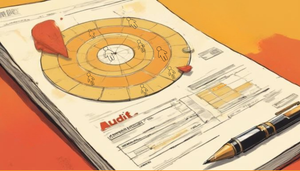
Do these sentences resonate? 👇
- "I feel like I can't be myself unless I'm making my partner happy."
- "Sometimes I wonder if we're together because we love each other or because we can't function alone."
- "My friends say I've lost myself in my relationship, but it doesn't feel wrong to care this much."
Let's be honest: the line between "caring deeply" and "losing yourself" is thinner than we think. It's time to redefine what healthy love actually looks like.

"Healthy love doesn't complete you—it celebrates the completeness you already are." — Nedra Glover Tawwab, therapist and boundaries expert
What Do Independent vs. Dependent Relationships Actually Mean? 🤔
Think of relationships like a dance between two people. Sometimes you're close, sometimes you step apart, but you're both still moving to the same rhythm.
The Relationship Spectrum ✨
Independence in relationships = You can groove to your own beat while still being part of the duet
Dependence = You can't find your rhythm without your partner calling all the steps
Interdependence = The sweet spot where you choose to rely on each other because it makes you both stronger, not because you can't survive apart
Here's what's interesting: 84% of Gen Z believes there's a mental health crisis in America, and this awareness is changing how young people approach relationships. Unlike previous generations, many Gen Zers discuss their mental health needs early in dating—which can create deeper intimacy, but also blur the lines between healthy vulnerability and unhealthy dependence.
What Does Codependency Actually Look Like? 🚩
Codependency is when the balance tips too far. One person becomes the "caretaker" (constantly rescuing, fixing, enabling) while the other becomes the "taker" (relying on their partner for emotional regulation, decision-making, or self-worth).
You might be in a codependent pattern if:
- You feel responsible for your partner's emotions and happiness
- Your mood depends entirely on how your partner is feeling
- You struggle to make decisions without your partner's input
- You ignore your own needs to keep your partner happy
- You feel guilty or anxious when setting boundaries
- Your friends say you've "lost yourself" in the relationship
Research shows that codependent relationships involve excessive reliance where one person's problems consistently become the other's , leading to resentment and stunted personal growth.
What Healthy Interdependence Looks Like ✨
Interdependent relationships have mutual respect and balanced give-and-take. People in interdependent relationships maintain their autonomy while choosing to depend on each other —it's about building a life together while still being whole individuals.
Signs of healthy interdependence:
- You support each other's goals and dreams
- You can disagree without fearing abandonment
- You have interests and friendships outside the relationship
- You ask for help when you need it, but can cope independently too
- Conflicts feel like "us vs. the problem" rather than "you vs. me"
- You feel secure enough to be vulnerable without losing yourself
How This Hits BIPOC, First-Gen, and Low-Income Young Adults Differently 🧑🏽🎓
Research reveals specific patterns that affect relationship dynamics for underrepresented communities:
Cultural and Family Pressures
BIPOC relationships may face additional stress from:
- Cultural expectations about family loyalty and gender roles
- Community approval pressures
- Different definitions of "normal" relationship dynamics
First-gen college students navigate unique challenges:
- Managing family obligations while building romantic partnerships
- 34.2% are more likely to be in long-distance relationships, which can intensify dependency patterns
- Balancing identity between family background and new opportunities
Economic Factors Shape Everything
When survival is on the line, the distinction between love and practical dependence gets blurred. Research on low-income couples shows that financial stress accelerates relationship milestones—about one-fifth become sexually involved within the first week, and one-third move in together within 6 months.
Different Models of "Normal"
If you grew up watching family members in codependent or volatile relationships, interdependence might feel foreign or even "cold." When you're the first in your family to have certain opportunities, you might not have models for what healthy, equal partnerships look like.
Identity conflicts show up as:
- People-pleasing to avoid conflict (codependency)
- Building emotional walls for protection (avoidance)
- Feeling pressure to "choose sides" between your background and your relationship
This Shows Up in Family Relationships Too 👨👩👧👦
These patterns absolutely exist beyond romance:
Parent-child codependency: When parents rely on you for emotional support or you feel responsible for "fixing" family problems
Sibling dynamics: Being the family caretaker, translator, or problem-solver
Extended family expectations: Feeling obligated to prioritize family needs over your own growth
The same principles apply everywhere: healthy relationships involve mutual respect, appropriate boundaries, and supporting each other's individual growth.
What Gen Z Actually Wants From Relationships 💕
Current research shows Gen Z is prioritizing mental health, authenticity, and meaningful connections over traditional relationship escalation.
The data tells the story:
- Marriage ranks 10th in Gen Z's long-term goals (compared to 4th for Millennials)
- Personal development takes priority over relationship status
- More open to diverse relationship structures and redefining traditional roles
- "Situationships" as a way to build connection without immediate pressure
- Early mental health discussions to foster authenticity
- Higher fear of rejection than previous generations
Understanding these patterns is the first step toward building healthier connections. But the real work happens when you look honestly at your own relationship style and what you want to change.

"The goal of a relationship isn't to have another who completes you, but to have another with whom you can share your completeness." — Neale Donald Walsch
Take a moment to honestly assess where you are:
- When YOUr partner is upset or stressed, what's YOUr immediate reaction?
- How do YOU feel when YOUr partner wants space or time with friends?
- What parts of YOUrself do YOU feel YOU've lost or hidden in relationships?
- How do YOU handle conflict?
- What would YOU do if this relationship ended tomorrow?

"A healthy relationship is one where two independent people just make a deal that they will help make the other person the best version of themselves." — Unknown
Click on the dropdowns below to see the easy action items:
Do one of these things TODAY 👇
If you tend toward codependency:
- Start small with boundaries: "I need 30 minutes to decompress after work before we talk about our days"
- Rediscover your interests: Make a list of things you enjoyed before this relationship—try one this week
- Practice self-soothing: When your partner is upset, resist the urge to immediately fix it. Offer support but let them feel their emotions.
- Check your motivations: Before helping, ask "Am I doing this because they asked, or because I need them to be okay for me to be okay?"
If you lean toward over-independence:
- Practice small vulnerabilities: Share something you're worried about instead of handling everything alone
- Ask for specific support: Instead of "I'm fine," try "I'm stressed about X, could you help me think through it?"
- Notice relationship bids: When your partner reaches out for connection, practice engaging instead of deflecting
- Set phone boundaries: Try putting devices away during dedicated time together
For everyone:
- The "24-hour rule": When conflicts arise, take a day to think about your own feelings before discussing
- Weekly check-ins: "How are you feeling about us? What's working? What would you like more/less of?"
- Maintain your friendships: Healthy relationships enhance your other connections—they don't replace them
Say one (or all) of these affirmations out loud 👇
- "I can love deeply while staying true to myself"
- "My worth doesn't depend on making others happy"
- "I choose to be with my partner—I don't need them to complete me"
- "Healthy boundaries strengthen my relationships"
- "I can offer support without taking responsibility for others' emotions"
Channel that feeling 👇
Feeling suffocated? Take three deep breaths and remind yourself that asking for space doesn't mean you love less
Feeling guilty for having needs? Remember that modeling self-respect teaches others how to treat you
Feeling scared to be vulnerable? Start with low-stakes sharing—you don't have to trauma dump to be authentic
Some vibes to close us out
The most beautiful relationships aren't about finding someone to complete you—they're about choosing someone to grow alongside.
Whether you're learning to let others in or learning to maintain yourself within connection, every small step toward balance matters.
Healthy love multiplies your joy and supports your healing, but it doesn't do the work for you.
You deserve relationships that see all of you and still choose to stay—not because they need to, but because they want to.
YOU got this. 💭✨
Sources
- “Gen Z and Dating: Prioritizing Mental Health, Authenticity, and Meaningful Connections.” Lebanon Valley College (2025).
- “Difference Between Codependency and Interdependence.” Start My Wellness (2024).
- "They Put Off Relationships Until They Earned Enough Money." The New York Times (2025).

Dig into this topic deeper by signing up for our FREE newsletter.
You'll be able to download the reflection worksheet to put all these actions into one page.
Once you're in, come back to this page and download your new go-to resource.





